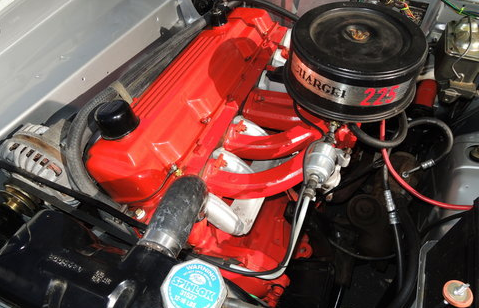When it comes to vehicles, the engine type nyt is a game-changer. It’s not just about horsepower or torque; it’s about how your vehicle performs under various conditions and what it means for your driving experience. Whether you’re navigating city streets, cruising on highways, or tackling rugged terrains, the right engine can enhance every journey.
Have you ever wondered why some cars feel peppy while others seem sluggish? The secret often lies in their engine design. As technology evolves, so too does our understanding of different engine types and their capabilities. This guide explores everything you need to know about engines—shedding light on how they work and what makes each unique.
From gas-guzzlers to eco-friendly hybrids, we’ll dive into the pros and cons of each engine type. If you’ve been pondering which one suits your lifestyle best or simply want to stay ahead in automotive knowledge, this post is tailored for you! Let’s rev up that curiosity as we explore the fascinating world of engines together.
The importance of engine type in vehicle performance
Engine type nytplays a crucial role in determining how a vehicle performs on the road. It influences acceleration, handling, and overall driving dynamics. A powerful engine can provide that exhilarating rush when you hit the gas pedal, while a more efficient one might offer better everyday usability.
Different engine designs respond to driver input in unique ways. For instance, turbocharged engines deliver quick bursts of speed with less displacement. In contrast, naturally aspirated engines often provide smoother power delivery but may lack that instant kick.
Moreover, an engine’s configuration affects weight distribution and balance within the vehicle. This impacts not only performance but also safety and comfort during travel. The right engine type nyt aligns with your specific needs—be it commuting or weekend adventures—making this choice essential for optimal vehicle performance.
Understanding the different types of engines
Engines come in various types, each with its unique characteristics and applications. The most common are internal combustion engines. They convert fuel into mechanical energy through a series of controlled explosions.
Next up is the electric engine. These powertrains rely on batteries to deliver instant torque, providing a smooth driving experience while being more environmentally friendly.
Hybrid engines combine both gas and electric systems. This dual approach allows for improved fuel efficiency without sacrificing performance.
Then there are diesel engines, known for their durability and fuel economy. They’re often favored in heavy-duty vehicles due to their ability to handle larger loads efficiently.
We have rotary engines, which utilize a distinct design that offers compact size and fewer moving parts. Each type serves specific needs based on performance demands or environmental considerations. Understanding these differences can guide you toward better vehicle choices.
Advantages and disadvantages of each engine type
When exploring engine types, each has its own set of advantages and disadvantages. Internal combustion engines are widely popular for their power and efficiency. They deliver robust performance but can fall short in fuel economy and emissions.
Electric engines shine in efficiency, offering instant torque and low operating costs. However, they often face limitations regarding range and charging infrastructure.
Hybrid engines attempt to balance the two worlds. They provide flexibility with reduced emissions compared to traditional gas engines. Yet, complexity can lead to higher maintenance needs.
Diesel engines excel with superior torque and longevity, making them ideal for heavy-duty applications. Unfortunately, they may struggle with higher emissions regulations.
Rotary or Wankel engines are compact and lightweight while delivering smooth power delivery. Their downsides include lower fuel efficiency and limited availability in modern vehicles. Each type brings unique traits that cater to different driving experiences.
How to choose the right engine type for your needs
Choosing the right engine type nyt can feel overwhelming. Start by assessing your driving habits. Do you commute in heavy traffic or enjoy weekend road trips?
Consider fuel economy as a key factor. If efficiency matters, think about hybrids or electric engines. They often provide lower running costs and reduced emissions.
Also, evaluate the power you require. For towing or off-roading, a V6 or V8 might be necessary for better performance under stress.
Don’t overlook maintenance aspects either. Some engines demand more frequent servicing and specialized care, while others are designed to last with minimal attention.
Budget plays a critical role too. Weigh initial costs against long-term savings on fuel and repairs before making your choice.
Innovations and advancements in engine technology
The world of engine technology is rapidly evolving. Innovations are transforming how we think about vehicle performance and efficiency.
Electric engines have gained significant traction. They offer instant torque and reduced emissions, appealing to eco-conscious consumers. Battery advancements also mean longer ranges and quicker charging times.
Hybrid systems combine the best of both worlds—electric power for short trips and a traditional engine for extended journeys. This versatility enhances fuel efficiency without sacrificing convenience.
Further, manufacturers are experimenting with alternative fuels like hydrogen. Hydrogen fuel cells promise zero-emission driving while maintaining high energy output.
Additionally, software plays a crucial role in modern engines. Advanced algorithms optimize performance based on driving conditions, improving fuel economy while enhancing safety features.
These innovations not only redefine what vehicles can do but also pave the way for more sustainable transportation solutions moving forward.
The impact of engine type on fuel efficiency and emissions
Engine type nytplays a crucial role in determining fuel efficiency and emissions. Different engines operate on varied principles, which directly affects how much fuel is consumed during operation.
For example, internal combustion engines typically produce higher emissions compared to alternatives like electric motors. Gasoline engines release carbon dioxide and pollutants that contribute to air quality issues. Diesel engines are often more efficient but can emit nitrogen oxides and particulates.
On the other hand, hybrid engines combine both gasoline and electric power. This setup allows for reduced emissions while improving fuel economy, making them a popular choice for eco-conscious drivers.
Advancements in technology also influence these factors significantly. Innovations like turbocharging can enhance performance without sacrificing efficiency, while direct injection helps optimize fuel use.
As manufacturers strive for greener solutions, understanding engine types becomes essential for every consumer aiming to minimize their environmental footprint.
Conclusion:
Choosing the right engine type is crucial for maximizing your vehicle’s performance and efficiency. As we’ve explored, each engine type has its unique advantages and disadvantages that cater to different driving needs. Understanding these nuances can help you make informed decisions based on your lifestyle and preferences.
The innovations in engine technology continue to shape how we view power, fuel efficiency, and environmental impact. As manufacturers invest in research and development, new engines are becoming more efficient with lower emissions while still delivering impressive performance.
Whether you’re after speed on a racetrack or fuel economy on your daily commute, understanding the various engine types will guide you toward making the best choice for your vehicle. Embracing advancements in technology means not only enjoying better performance but also contributing to a more sustainable future for our planet. Engage with this knowledge; it empowers you as a driver and consumer alike.


